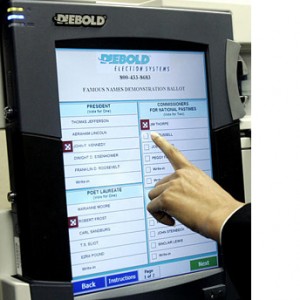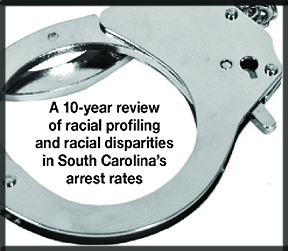 For more information, click here.
For more information, click here.
Tag Archives: SC Progressive Network
Help us now to protect your vote in November!
SC Progressive Network Director Brett Bursey filed a complaint in federal court on June 17 to require the state to preserve voting records in federal elections. Since then, the Network has worked to arrange an audit of the entire June 8 South Carolina primary vote.
As you know, the results of two federal elections — US Senate and Congressional District 1 — were, in the words of numerous well-credentialed experts, “anomalous.”
The Verified Voting Foundation released a statement on the South Carolina primary results that concluded, “Whether specific reports of irregularities in this election are confirmed, the most important fact about South Carolina’s voting system is that most ballots cannot be effectively audited or recounted. Serious concerns about the integrity of the primary (and of other elections conducted using the same technology) are inevitable, and legitimate.” For the full statement go to Verified Voting.org.
Since a “recount” of the voting machine tallies we use in South Carolina can only produce the same number, over and over, an audit of the internal memories on the machines is the only way to discover anomalies — and even this won’t reveal the intent of the voter beyond what is recorded by the software.
South Carolina is one of only eight states that uses paper-less, touch-screen devices that are not routinely audited. Thirty-four states now require a “voter verified paper ballot” that can be referred to in the event of a recount or audit.
“We are not questioning the results of the June 8 primary,” said Bursey. “We are questioning whether the machines we use can be audited to insure that the results reflect the voters’ true choices, and if the preserved records satisfy federal requirements.”
Yesterday, we gave up on trying to get the SC Election Commission to agree to a third-party audit of the entire system. The executive director of the SCEC, as well as the board chair, both had roles in the purchase of these machines in 2004. They maintain that the system works fine and no audit is necessary.
We are now focusing on the federal complaint we have filed that questions whether the intent of the federal records preservation statute can be met using the counties’ current systems and software. Our lawsuit is the only thing standing between us and another election in November with unverifiable results.
We have filed a request for all the compact discs that each county was supposed to have used to record the flash memory of each voting machine.
The state Election Commission does not know if all counties followed this procedure, or whether this procedure adequately preserved the records, or whether what is preserved is sufficient to reliably determine the voters’ intent. The state Election Commission is arguing that it is not its job to keep these records, nor to gather them for us.
We need immediate financial help to make our case. We need to raise $3,000 to cover filing fees and expert assistance. If you can help, please do.
We hope that this case, and the growing public awareness of the inherent shortcomings of our voting system, will lead to a voter-verifiable, recountable, paper record of the most critical part of our democracy — our vote.
Please make a secure donation now and indicate in the gift information “verified voting.”
Thank you for your support.
SC Progressive Network scrambles to preserve voting machine records
If the 46 county election offices are not stopped, within days they will erase the most critical data from the memories of all the voting machines, warns SC Progressive Network Director Brett Bursey. With controversy over the reliability of the touch-screen computers heating up, the Network is working to ensure that valuable information is not lost as counties prepare the machines for the upcoming run-off elections.
Bursey explained that the state Election Commission only keeps a summary of the information from the counties, and that only by preserving or copying the flash cards (memory chips) inside the computer will there be enough information to perform an audit.
“There is no way the machines you have in South Carolina can be audited without all the information on the computer flash card in each machine,” Dr. Douglas Jones said. Jones has taught at the University of Iowa Department of Computer Science since 1980, served on the Iowa Board of Examiners for Voting Machines and Electronic Voting Systems from 1994 to 2004, and chaired the board for three terms.
Jones, who serves on the Federal Election Assistance Commission’s Technical Guidelines Development Committee, has performed numerous audits on voting machines like those used in South Carolina. He provided the Network with an affidavit outlining the necessary steps to preserve data for an audit.
“We have been in communication with the US Justice Department’s Voting Rights Section,” Bursey said. “We are arguing that erasing the data violates the federal statute (USC 42-1974) that requires all records in a federal election to be preserved for 22 months.”
Bursey said that if the Justice Department doesn’t intervene, they will try to get a federal judge to order a halt to erasing the records. “We are not questioning candidates, motives or conspiracy theories,” Bursey said. “We simply want a trustworthy audit to assure that all votes are counted accurately.”
“It’s not difficult or expensive to copy the flash card,” Dr. Jones said. “You can hook up a flash card reader that you use to download pictures on your computer from a digital camera and save the data to a CD.” Replacing the flash card would cost a few dollars for each machine.
The flash card records all actions taken on the machine, the time of the vote or any errors in an “events log.” The “ballot image log” records the actual ballot cast. The detailed information on the flash cards is not saved by the state or counties and is routinely erased to prepare the machines for the next election.
Even as the calls increase for investigations into several races, counties will erase the data and install the ballot program for the June 22 runoff. “In a matter of days, there won’t be any way to determine whether the machines played a role in the unusual vote counts,” Bursey said. “We simply want a trustworthy audit to assure that all votes are counted accurately.”
Sen. Phil Leventis (D-Sumter) has sponsored legislation to require voting machines to produce a voter-verifiable paper record that can be used to recount or audit an election.
“With these machines not only is there no paper trail to examine, if the records are erased it’s like cremating the body before the autopsy is performed,” he said.
The Network presented expert testimony at a SC Election Commission Board meeting in 2004, urging the agency not to buy the iVotronic computers that do not have a voter verified paper record. SC is one of four states that has neither a paper record nor a regular audit of its machines.
SC Progressive Network’s racial profiling study reveals SC traffic cops breaking the law
The SC Progressive Network has released a study — based on a review of racial disparities in arrest rates and a new law requiring cops to report the race of those stopped for traffic warnings — that reveals most police agencies in the state are breaking the law by not reporting. The most recent report on the Department of Public Safety’s web site reveals that 189 of the state’s police agencies are not in compliance.
The Network is circulating this study to stimulate public dialogue about racial profiling and to encourage police agencies to advocate for a database that records all stops and allows for increased transparency.
Download the study here.
Does SC have a racial profiling problem?
Legislature urged to make law agencies process data to see how prevalent it is
By John Monk
The General Assembly needs to order all law enforcement agencies to process the racial data they collect on their traffic tickets to provide a snapshot of whether there is evidence of racial profiling.
That’s the conclusion of a 26-page report on racial profiling in state traffic stops just released by the S.C. Progressive Network. (You can download the study here.)
The state Highway Patrol analyzes the race of drivers given warning tickets by troopers because of a 2005 law. But it doesn’t analyze the race of those given actual citations for such offenses as driving under the influence of alcohol, speeding or breaking the state’s seat belt laws.
Other law enforcement agencies collect similar racial data on tickets of their own volition, but also don’t analyze it.
All of that needs to change, according to Brett Bursey, director of the S.C. Progressive Network.
“After all, the race of over 2 million drivers a year is already recorded on all traffic tickets, but that data is not put in a form so it may be examined for patterns,” Bursey said.
Racial profiling is a term that refers to the improper targeting of a motorist because of his or her race, not because of a driving issue.
Bursey said that since the General Assembly is required this session to review a 2005 state law that mandated that warning ticket data be analyzed, now is the time for that issue to be studied anew.
The 2005 law requires the Senate Transportation Committee and the House Education and Public Works Committee to make recommendations on how that law can be improved – if any are deemed necessary.
Rep. Joe Neal, D-Richland, a longtime supporter of better racial traffic stop data, agreed with Bursey.
“This goes to public confidence in laws and justice. To ensure our system is truly color blind, we need to understand what actually is happening when tickets are given,” Neal said.
Analyzing existing racial traffic stop data apparently would not be difficult or cost much money, law enforcement officials indicated.
Neal and Bursey say the state already collects and analyzes racial data in two law enforcement areas: prison populations and suspects arrested for serious crimes like murder.
And one major agency – the Richland County Sheriff’s Department – has been collecting and analyzing racial data on its 20,000-plus annual traffic stops for 10 years.
“It’s fast and it doesn’t cost anything,” said Sheriff Leon Lott.
Lott’s data gives an overall picture of how the race and ethnicity of stopped motorists compares with county racial demographics. The individual traffic stop records of each of Lott’s 500 deputies can be easily examined for possible profiling, he said.
Three years ago, Lott said, his data helped prove a deputy was targeting blacks and Hispanics. The officer was arrested and fired.
Statistics alone aren’t proof of racial profiling, Lott said. Further investigation is needed to establish the complete situation, he said.
“The statistic is the baseline to start looking,” he said.
A spokeswoman for the S.C. Department of Motor Vehicles, which handled 1.9 million adjudicated traffic tickets last fiscal year, said it wouldn’t be difficult to write a software program to extract an overall racial picture of citations in which people have been found guilty of violations.
DMV official Beth Parks estimated it would take about two hours and cost at least $200 to arrive at a computer-generated racial profile of last year’s citations to which people were found guilty. She did not have an estimate of what percentage of the 1.9 million citations itwould be.
Last year, as the 2005 law required, the DPS analyzed – and made public – overall race data on 377,676 warning tickets the Highway Patrol issued.
But those warning tickets are only 41 percent of 904,348 tickets it issued last year for seat belt, DUI and other violations.
Last week, DPS director Mark Keel, at The State’s request, examined how his agency handles racial data in the 59 percent of actual citations.
“We have learned we do have the ability to do things with this data that we have not fully explored and fully utilized,” Keel said.
For example, said Keel, DPS can access each trooper’s record of the race of the people who get citations. Racial breakdowns of all citations in individual counties also are available, Keel said.
In the past, such matters as reducing the highway death rate and dealing with budget concerns, have taken much of his attention, Keel said.
But DPS already is having conversations about how to make better use of the data, including possibly making some of the overall patterns publicly available, Keel said.
Keel also said troopers’ supervisors already monitor their officers’ performance, and any racial profiling should be detected now, from an examination of troopers’ tickets issued as well as video made at traffic stops. Before Keel assumed his job in 2008, a few of those videos made the news because they showed troopers mistreating motorists, some of them black.
An official at the Denver-based National Conference of State Legislatures, which tracks state laws, said a “fair number” of states track and process racial profiling data for traffic stops. She did not have specific numbers.
Lott said he has had good results gathering such data.
“It’s another tool,” Lott said. “You do it because it’s the right thing to do.”
Bursey said he hopes law enforcement will take the lead on creating a transparent database. “Good cops don’t mind sharing this data with the public.”
(The Progressive Network’s report can be viewed at www.scpronet.com.)
LGBT groups spearhead Charleston anti-discrimination victory
Because of the collaborative effort among LGBT groups — including SC Progressive Network member organizations AFFA and SC Equality — the city of Charleston now has proactive legislation protecting LGBT people in both housing and public accommodations.
Last week, the Charleston City Council passed ordinances expanding the city’s existing policy prohibiting discrimination in housing to include age, sexual orientation and gender identity The council also passed a public accommodations ordinance prohibiting discrimination on the basis of race, color, religion, sex, age, disability, familial status, national origin, sexual orientation or gender identity.
The ordinances were presented to the mayor’s office in August by AFFA, SC Stonewall Democrats, SC Log Cabin Republicans, American Civil Liberties Union and South Carolina Equality–who paved the way by successfully introducing similar ordinaces in Columbia, SC, last year.
Charleston is the second municipality in the state to pass comprehensive human rights ordinances in housing and public accommodations that include sexual orientation and gender identity. Council Member Gary White said, “It’s a step forward in the right direction in making sure that we are not discriminating against anyone.”
Read the ordinances here.



